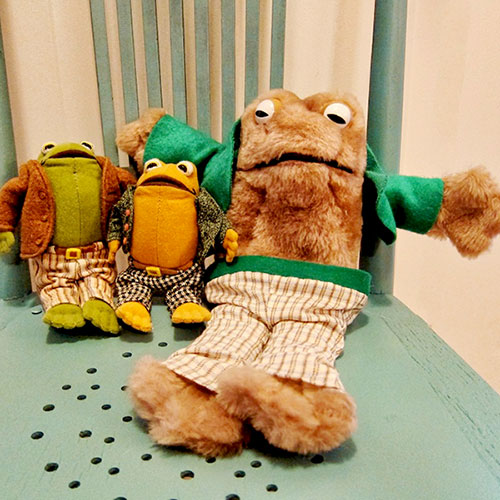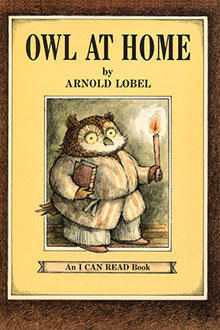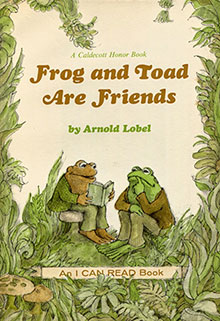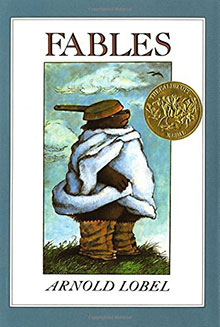Every winter I find myself missing Arnold Lobel, a quietly brilliant author-illustrator who left us far too early. I pull out my Lobel I Can Read collection. Frog and Toad Are Friends was published in 1970, the year I graduated from high school, bent on my own career in children’s books. Hailed an instant classic by many far-seeing individuals, Frog and Toad earned a Caldecott Honor. My copy, the first Harper Trophy edition, is from 1979. That same year I bought a set of Frog and Toad stuffed dolls because they were so ridiculous. Lobel remarked in an interview, “Their pants kept falling down in the early mock-ups, but they’ve fixed that.”

Not exactly. My Toad doll wears what can only be called plumber’s pants. Yet amphibians dressed in falling-down trousers is just the sort of thing that would amuse Lobel. He drew inspiration from fabulist Edward Lear. Like Lear, Arnold Lobel possessed an imagination unfettered by the laws of logic and probability. The stories in the Frog and Toad quartet are absurd, tender, and deceptively simple. They are also perfect. When students ask my advice on writing easy readers, I send them to Frog and Toad. “Aim for the pinnacle,” I tell them.
 As much as I love Frog and Toad, I’m equally fond — maybe a little more so — of Owl at Home. Lobel once described Owl as “a complete psychotic,” but I find his character charmingly eccentric. In each of the five stories, Owl is all alone. No wonder he’s a bit different. In “The Guest,” Owl feels sorry for poor old Winter out in the cold and invites Winter into his house. Gusts of snow and wind blow wildly through the room. Owl learns the hard way that not all guests have manners.
As much as I love Frog and Toad, I’m equally fond — maybe a little more so — of Owl at Home. Lobel once described Owl as “a complete psychotic,” but I find his character charmingly eccentric. In each of the five stories, Owl is all alone. No wonder he’s a bit different. In “The Guest,” Owl feels sorry for poor old Winter out in the cold and invites Winter into his house. Gusts of snow and wind blow wildly through the room. Owl learns the hard way that not all guests have manners.
In another story, Owl is concerned that the upstairs of his house is lonely when he is downstairs and vice versa. He races up and down the stairs, trying to be in two places at once. Exhausted, he finally sits on the middle step. It’s utter nonsense but the child in me loves the fact Owl worries that the floor he isn’t on misses him. Owl makes tear-water tea by thinking of sad things like spoons dropped behind the stove, pencils too short to use, and songs that can’t be sung because the words have been forgotten. His tears fill the kettle for a salty but refreshing tea.
Owl goes for a walk in “Owl and the Moon.” When the moon rises, he reasons that if he sees the moon, then the moon sees him, and they must be friends. On his way home, Owl notices the moon following. He tells the moon to go back. “You really must not come home with me. My house is too small. You would not fit through the door. And I have nothing to give you for supper.” My heart turns over at Owl’s distress over being unable to feed the moon. In the end, Owl realizes the moon is shining in his bedroom: “What a good, round friend you are.” This book makes me want to knock on Owl’s door and ask him to lunch.
 The Frog and Toad books were inspired by vacations on Lake Bomoseen, Vermont, where Lobel’s children caught frogs and toads and other small animals. While Frog and Toad received the most praise (Caldecott Honor, Newbery Honor, National Book Award finalist, Children’s Book Showcase, George G. Stone Award) and are still highly regarded, I feel Owl at Home is a sleeper. Owl reminds me of the boy Arnold, who struggled to make friends.
The Frog and Toad books were inspired by vacations on Lake Bomoseen, Vermont, where Lobel’s children caught frogs and toads and other small animals. While Frog and Toad received the most praise (Caldecott Honor, Newbery Honor, National Book Award finalist, Children’s Book Showcase, George G. Stone Award) and are still highly regarded, I feel Owl at Home is a sleeper. Owl reminds me of the boy Arnold, who struggled to make friends.
In both writing and art, Lobel hit his stride with his I Can Read books. Spot illustrations and framed vignettes in only two or three colors gently guide new readers through the texts. Lobel didn’t like bright colors in “those little books,” as he referred to them. “In my early years I used to do bright colors … and I really wasn’t happy, so I gradually got muter and muter and became more pleased with the aesthetic result.” It has been said that his beginning readers promote intimacy, safety, and a sense of order. To me, they feel like home.
The animal characters in those little books dwell in cozy houses, with comfy furniture, books, and flowers. They tell stories, read — sometimes to each other — take walks, garden, and drink tea. Lobel loved creating books for children: “There is a little world at the end of my pencil.” But he wasn’t always a ray of sunshine. His childhood was lonely. He kept part of his adult life hidden. “When I am brought low by the vicissitudes of life,” he once remarked, “I stumble to my bookshelves. I take a little dose of Zemach or Shulevitz. I grab a shot of Goffstein or Marshall … the treatment works. I always feel much better.”
 I met Arnold Lobel once. An illustrator friend and I went to hear him speak in the fall of 1980, the year he won the Caldecott for his picture book Fables. As a presenter, he was modest, funny, and generous. After the event, my friend and I headed for the parking lot when we saw Lobel walking alone to his rental car. We couldn’t believe that a Caldecott winner was all by himself. My friend asked him a few questions about making picture books, which he answered honestly. I stayed quiet. It was enough to stand next to the man who brought Frog and Toad and Owl and other characters into my world.
I met Arnold Lobel once. An illustrator friend and I went to hear him speak in the fall of 1980, the year he won the Caldecott for his picture book Fables. As a presenter, he was modest, funny, and generous. After the event, my friend and I headed for the parking lot when we saw Lobel walking alone to his rental car. We couldn’t believe that a Caldecott winner was all by himself. My friend asked him a few questions about making picture books, which he answered honestly. I stayed quiet. It was enough to stand next to the man who brought Frog and Toad and Owl and other characters into my world.
In the winter of 1987, Arnold Lobel died at age 54, one of the first in the children’s book community to fall victim to AIDS. He once said in a speech, “To be making books for children is to be in a sort of state of grace.” I try to remember those words when I’m feeling less than charitable toward the industry that’s been my home for nearly 40 years. When I’m brought low by the vicissitudes of life, I visit Frog and Toad, Owl, Grasshopper, and Uncle Elephant. Lobel’s treatment works. I always feel welcome.

Owl at Home is one of my absolute favorites. I re-read it every January.
What a beautiful remembrance of Lobel and his works. I have the complete set of “Frog and Toad” as well as “Owl at Home” on my bookshelf, within reach of my rocking chair where I write. I envy you having the opportunity to have met Arnold Lobel in person once. So true he was gone all too soon.